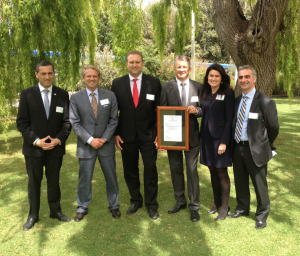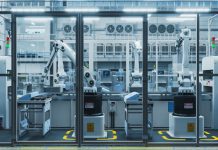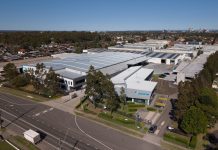Kimberly-Clark Australia, a global leader in the “essentials for a better life” in Consumer and Business-to-business markets, has announced a new $20 million investment into its Millicent Mill in SA aimed at increasing production of its high quality Kleenex products.

- Pictured: The Honourable Tom Koutsantonis MP, South Australian Treasurer and Minister for Finance, Tony Palmer, President of Global Brands and Innovation K-C Corporation, Robbert Rietbroek, Managing Director & CEO, K-C Australia, New Zealand & The Pacific Islands, Scott Whicker, Millicent Mill Manager, Jacquie Fegent-McGeachie Head of Corporate Affairs & Sustainability, K-C, Tony Circelli, Chief Executive, South Australian Environment Protection Agency.
Speaking at the celebration ceremony at the company’s manufacturing facility in Millicent, Managing Director Robbert Rietbroek said the investment would ensure the future competitiveness of the business.
“Manufacturing in Australia continues to be challenging, but we are looking at every aspect of our business to drive efficiencies and innovation to ensure our business remains competitive. Investments totalling $20 million will go into capacity improvements and equipment upgrades to enable us to sustain and increase production of our high quality Kleenex products,” Mr Rietbroek said.
The company also announced the expiry of a 50 year indenture with the South Australian Government and proactive transition into a licensed agreement with the Environment Protection Agency (EPA) which covers waste water in the area surrounding the Millicent Mill.
“Over the past decade alone, Kimberly-Clark Australia has invested over $370 million into the South East region of South Australia. This investment includes improving the quality of our waste water and today, I’m proud to say that our wastewater meets Australian Drinking Water Guidelines. Our experience has been that sustainability initiatives are not only good for the environment, they are also good for business,” stated Rietbroek.
“It is pleasing to see a leading South Australian manufacturer demonstrate a continuous improvement culture, reducing its footprint from an energy and environmental perspective. Kimberly-Clark has not only dramatically reduced the volume of its wastewater discharges, but the quality of that water has improved greatly, with a 95% reduction in phosphorous load and an 89% reduction in nitrogen load in recent years,” said Chief Executive of the South Australian EPA, Tony Circelli.
The event, which was attended by The Honourable Tom Koutsantonis MP, also celebrates the successful start-up of a $33 million state of the art cogeneration facility, which takes the Millicent Mill off the electricity grid and reduces its carbon dioxide emissions by around 80,000 tons per annum.
“It is great to see a leading South Australian manufacturer making investments and confirming its commitment to manufacturing in the State. Kimberly-Clark Australia’s new cogeneration facility at the Millicent Mill supports the Premier’s strategic priority of growth through innovation and the Government’s commitment to advanced manufacturing,” Mr Koutsantonis said.
Talking on Kimberly-Clark’s commitment to sustainability, Rietbroek acknowledged the leadership of the Millicent Mill in assisting Kimberly-Clark Australia progress its 2015 sustainability targets.
“We are very proud of our award winning sustainability program. As our largest site in Australia, many of our major sustainability efforts have been led by the team at Millicent Mill who have a proven history of innovating to drive efficiencies in our operations to not only reduce costs, but significantly reduce our impact on the environment,” concluded Rietbroek.

















